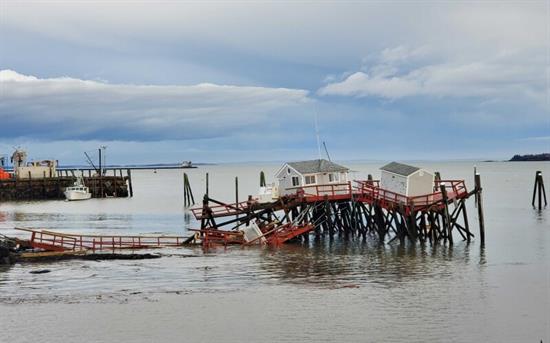Press Releases
Pingree Leads Bipartisan Effort to Support Working Waterfronts Affected by Natural DisastersThe bicameral Working Waterfronts Disaster Mitigation Tax Credit Act, introduced in the Senate by Sens. King and Cassidy, would provide working waterfronts with a 30% tax credit on up to $1 million in mitigation expenses, adjusted for inflation annually
Washington,
August 1, 2025
U.S. Representatives Chellie Pingree (D-Maine) and Greg Murphy, M.D. (R-N.C.) today introduced bicameral, bipartisan legislation to offer a disaster mitigation tax credit for working waterfronts. The Working Waterfronts Disaster Mitigation Tax Credit Act would allow working waterfronts situated along coastal areas and navigable waterways to claim a 30 percent tax credit on mitigation costs, up to $1 million, with annual adjustments for inflation. U.S. Senators Angus King (I-Maine) and Bill Cassidy (R-La.) introduced the companion legislation in the Senate. “From lobstering to boatbuilding, working waterfronts are the economic backbone of many coastal communities — but they’re vanishing under pressure from development and intensifying climate impacts,” said Congresswoman Pingree. “In Maine, we've seen firsthand how vulnerable our waterfront infrastructure is to extreme storms and flooding. At a time when coastal communities in Maine, Louisiana, North Carolina, and across the country are feeling the impacts of an ever-changing and increasingly volatile climate, working waterfronts and those they support need the tools to prepare for the next disaster, not just recover from the last. Our bipartisan, bicameral bill is about protecting jobs, preserving access, and ensuring the future of our coastal way of life.” “Properties used for commercial purposes in areas at risk of erosion and intense weather systems face unique challenges,” said Congressman Murphy, M.D. “As the representative of more than 80% of North Carolina's coastline, I understand how tide changes and storms can jeopardize local economies that conduct business along our shores. Ensuring the resiliency of waterfront commerce is essential to our coastal communities and this legislation enables businesses to mitigate the financial costs that come with working in these areas.” “Maine’s coastal communities are changing. From a warming climate to an evolving economy, the Gulf of Maine is facing challenges that will define our state’s success for generations to come,” said Senator King. “The Working Waterfronts Disaster Mitigation Tax Credit Act would provide working waterfronts “Let’s empower coastal businesses to invest in flood and disaster prevention before a storm hits,” said Dr. Cassidy. “Doing so protects our way of life, fishing and coastal industries, and the livelihoods of Louisiana families.” Working waterfronts are comprised of physical property (including support structures over water and other facilities) that provide access to navigable waters to persons engaged in commercial fishing, recreational fishing and boating businesses, boatbuilding, aquaculture, or other water-dependent business used for the purpose of supporting a water-dependent business. The tax credit would be available to any small business that operates a working waterfront. For example, a coastal business owner can use this tax credit to invest in business-related infrastructure to protect property so that it does not suffer damage from rising water and storms. “Island Institute applauds Representative Pingree for introducing the Working Waterfronts Disaster Tax Credit Act. This proposed tax credit will be an important resource for small business owners, many of whom are still grappling with damage caused by catastrophic storms in January. Maine’s working waterfront businesses need all the tools they can get to help rebuild and prepare for the next storm. This essential piece of legislation assures Maine’s working waterfront businesses can take steps today that will help them to prepare for future impacts of climate change,” said Kimberly A. Hamilton, PhD, President of Island Institute. Pingree has long advocated for federal resources to help Maine communities preserve and expand shoreline access and infrastructure for water-dependent industries such as fishing, boat building, and aquaculture. She first introduced legislation to protect working waterfronts in the 111th Congress and is the author of the bipartisan Keep America’s Waterfronts Working Act, which would support coastal communities grappling with the climate crisis and preserve the character of coastal communities by protecting jobs, commercial activities, and public access to America’s coast. ### |

